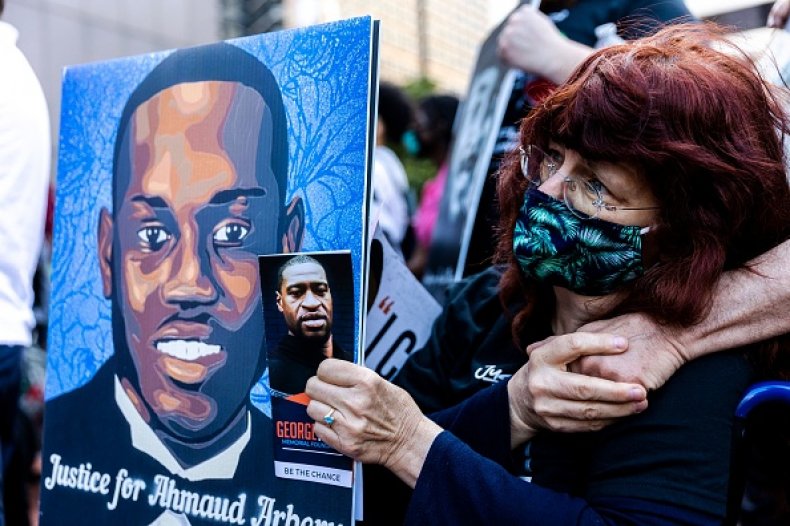If the jury convicts the three men accused of killing Ahmaud Arbery on the lesser charges in the case, it could open up a path for a felony murder charge without jurors having to consider whether the defendants intended to kill Arbery.
Each of the three men—Travis and Greg McMichael and William “Roddie” Bryan—face nine charges, including malice murder, felony murder, aggravated assault, false imprisonment and criminal intent to commit a felony in the death of Arbery.
Arbery was fatally shot while on a run near Brunswick, Georgia, on February 23, 2020 after the McMichaels and Bryan allegedly chased the jogger down with their pickup trucks and gunned him down.
Felony murder, under Georgia law, occurs when an individual causes someone’s death while committing another crime, “irrespective of malice”—meaning it would not matter whether the defendant intended or accidentally killed that person.
A common example of felony murder is in a case in which multiple people are involved in robbing a bank. If one person shoots and kills the bank teller, everyone involved in the crime, regardless if they knew that individual was armed, would still be guilty of a felony murder.
“Intent to kill is not needed to prove the offense,” criminal defense attorney Richard Lawson explained to Newsweek.
Kerem Yucel/AFP
Each of the defendants in the Arbery case has been charged with four counts of felony murder.
The McMichaels are also charged with two counts of aggravated assault—one involving a deadly weapon, the shotgun, and the other involving the trucks—and two counts of false imprisonment.
Bryan faces the same charge except for the aggravated assault count involving the pickup trucks, which the judge reduced to simple assault, reckless conduct or reckless driving on Tuesday.
If the jurors find the men guilty of any of those four lesser charges, which are felonies under state law, and determine that Arbery was killed while those crimes were being executed, multiple paths to convict them of felony murder would open up.
The jury would have to find that “[the defendants] must have committed a felony, such as false imprisonment, and as a result of the felony they committed, Mr. Arbery died,” Lawson said.
“If the lesser-included offenses are still felonies, then it could support a felony murder conviction,” he added.
Because the reduced charge of simple assault, reckless conduct or reckless driving against Bryan is a misdemeanor in Georgia, a conviction on that count would not put him up against a felony murder charge connected to this particular count.
The closing arguments of the trial concluded on Tuesday and the jury began deliberating just before noon.



















